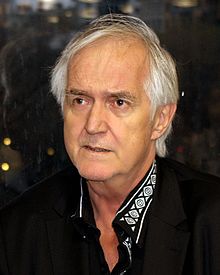Henning Mankell
| Henning Mankell | |
|---|---|

Mankell in New York City in 2011
|
|
| Born | Henning Georg Mankell 3 February 1948 , Sweden |
| Died | 5 October 2015 (aged 67) Gothenburg, Sweden |
| Occupation | Novelist, playwright, publisher |
| Period | 1991–2009 (Kurt Wallander series) |
| Genre |
Crime fiction Thriller |
| Notable works | The Kurt Wallander novels |
| Spouse | Eva Bergman (m. 1998–2015) |
| Children | 4 |
| Relatives | Ingmar Bergman (father-in-law) |
| Website | |
| www |
|
Henning Georg Mankell (Swedish pronunciation: [ˈhɛnˈnɪŋ ˈmaŋːkɛl]; 3 February 1948 – 5 October 2015) was a Swedish crime writer, children's author, and dramatist, best known for a series of mystery novels starring his most noted creation, Inspector Kurt Wallander. He also wrote a number of plays and screenplays for television.
He was a left-wing social critic and activist. In his books and plays he constantly highlighted social inequality issues and injustices in Sweden and abroad. In 2010, Mankell was on board one of the ships in the Gaza Freedom Flotilla that was boarded by Israeli military forces.
Mankell shared his time between Sweden and countries in Africa, mostly Mozambique where he started a theatre. He made considerable donations to charity organizations, mostly connected to Africa.
Mankell's grandfather, also named Henning Mankell, lived from 1868 to 1930 and was a composer. Mankell was born in , Sweden in 1948. His father Ivar was a lawyer who divorced his mother when Mankell was one year old. He and an older sister lived with his father for most of their childhood. The family first lived in Sveg, Härjedalen in northern Sweden, where Mankell's father was a district judge. In the biography on Mankell's website, he describes this time when they lived in a flat above the court as one of the happiest in his life. In Sveg, a museum was built in his honour during his lifetime.
Later, when Mankell was thirteen, the family moved to Borås, Västergötland on the Swedish west coast near Gothenburg. After three years he dropped out of school and went to Paris when he was 16. Shortly afterwards he joined the merchant marine, working on a cargo ship and he "loved the ship's decent hard-working community". In 1966, he returned to Paris to become a writer. He took part in the student uprising of 1968. He later returned to work as a stagehand in Stockholm. At the age of 20, he had already started as author at Riksteatern in Stockholm. In the following years he collaborated with several theatres in Sweden. His first play, The Amusement Park dealt with Swedish colonialism in South America. In 1973, he published The Stone Blaster, a novel about the Swedish labour movement. He used the proceeds from the novel to travel to Guinea-Bissau. Africa would later become a second home to him, and he spent a big part of his life there. When his success as a writer made it possible, he founded and ran a theatre in Mozambique.
...
Wikipedia
